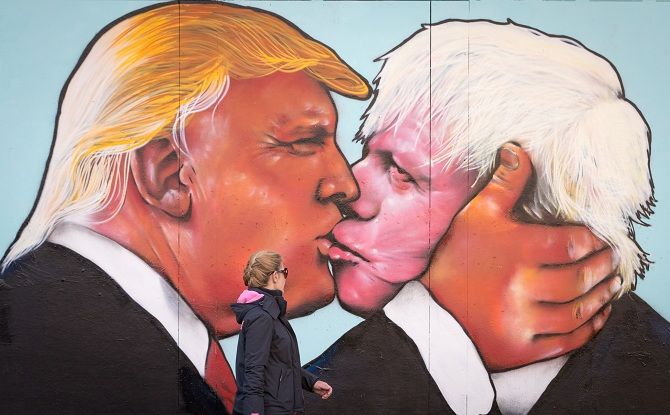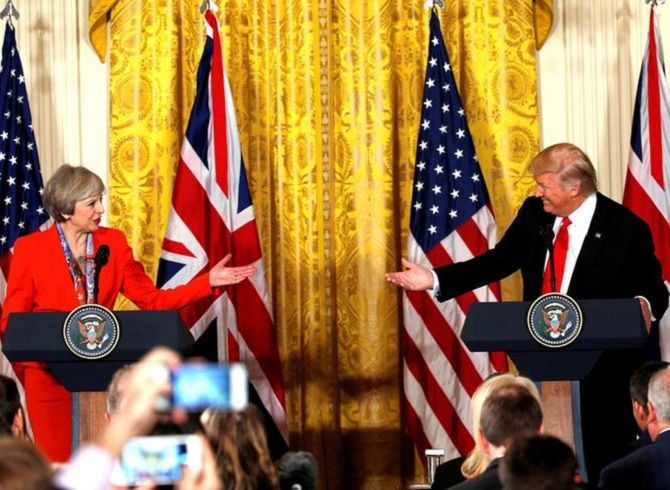Nothing, according to Deepak Lal.
He argues that the contemporary attempts to control immigration in the US and UK are not nativist.

Nativism has been an important feature of the US -- though a nation of immigrants.
It was characterised by John Higham, in his magisterial study Strangers in the Land: Patterns of American Nativism 1860-1925, as the hostility shown by native-born Americans towards immigration outside the Anglo-Saxon fold.
It was invented in the 1850s to describe the programme of the anti-Catholic, anti-foreign political party, the Know-Nothings.
But there have been waves of Nativism going back to the 1798 Alien and Sedition Acts to exclude or deport the European radicals who were seen as a threat to the infant republic.
Subsequent nativist waves have occurred when there is a 'political or economic crisis, combined with a loss of faith in American institutions and a sense that the national community is gravely fractured.'
With the nation's problems seemingly intractable, people seek scapegoats in the form of the 'Other' (James Crawford: 'Cycles of nativism in US History,'www.immigrationforum.org, 2001).
But are the contemporary attempts to control immigration in the US and UK nativist?
Higham in his later work, some unpublished, thought not. (See Jerry Kammer: 'It's not all about nativism: Historian John Higham's widening views on modern efforts to limit immigration',www.cis.org/higham).
For the central point about recent immigration is that it occurs in welfare States, where the immigrant has access to the purses of existing citizens through the public goods (education, health and housing) provided and financed by the State.
It thus creates property rights for immigrants, which existing citizens are justified in questioning.
Thus, despite the undoubted benefit to economic growth from immigration, there are also costs associated with the dilution of the property rights of existing citizens.
Furthermore, the failure to enforce the laws against illegal immigration brings the law into disrepute.
Finally, low skilled immigration damages the wages and welfare of the poorest wage earners.
Higham approvingly noted the Harvard economist George Borjas' claim that a 'high level of immigration is an astonishing transfer of wealth from the poorest people in the country, who are disproportionately minorities, to the richest.'
Thus, the desire to control immigration today is not necessarily nativist: A reflection of racism, xenophobia, and hostility toward immigrants.
Higham also warned of the need to enforce immigration laws in order to maintain comity and respect for the law. He expressed concern that narrowing economic opportunities for unskilled workers would constrain the social mobility that he saw as vital to the health of American society.
Finally, he was concerned that multiculturalism would undermine the benign nationalism that he saw as an alternative to nativism and weaken immigrants' identification with their adopted homeland.
Ethnic ghettos would prevent the traditional American melting pot from functioning.
Hence, Mr Trump's desire to deport illegal immigrants and control Mexican immigration is not nativist. After all he is married to a recent legal immigrant from Slovenia, who is only the second foreign-born First Lady of the US.
Nor are the supporters of Brexit nativists.
They are against the free movement of people from Europe -- a necessary commitment to being in the EU. They are particularly concerned by the pressure being put on British social services by immigrants from Eastern Europe.
They do not want to end immigration, but to control it to suit the needs of the UK economy, and diversify it to include other areas of the world, in particular the Commonwealth.

What of nationalism?
In a previous column I had outlined the various waves of nationalism identified by Benedict Anderson in his Imagined Communities: The Creole nationalism of the Americas, the vernacular nationalism of the rising European bourgeoisie, the official nationalism of the European dynasts to co-opt vernacular nationalism, and the anti-colonial nationalism of the subjects of Western imperial powers.
I noted how most 19th century thinkers like Karl Marx did not expect nationalism to survive the powerful cosmopolitan forces unleashed by the first period of globalisation under Pax Britannica. Yet with the nationalist passions unleashed by the two World Wars and the economic disorder of the Great Depression, these expectations were belied.
It was only with the second period of globalisation since 1980, associated with the Pax Americana, that cosmopolitanism has come to contest the nationalist impulse. A global cosmopolitan class has emerged.
English is increasingly its lingua franca.
It is educated in the same elite Western universities.
It is inter-married.
It works in public international organisations or private multinationals and global financial institutions with transnational interests and loyalties.
It was hoped that with the spread of free markets, free trade and free immigration, countries led by this cosmopolitan elite would lead to a prosperous world free of ethnic, religious and national conflicts. It was hoped that economic growth and liberalisation would lead to democratisation and a prosperous middle class, providing political stability.
This was to be Francis Fukuyama's 'end of history.' But this hope has been increasingly belied.
There has also been a growing cultural gulf between the cosmopolitans and their more locally based national citizens.
This has created a tension between the cosmopolitan openness demanded by globalisation, and the sense of loss of national identity with the transnational flow of labour, capital, goods and services which has removed former economic and social niches.
This has created a problem for Western political parties faced by the demands for economic liberalism and the resentment of the 'creative destruction' it requires. Mr Trump's economic nationalism is the response. It threatens to dismantle the liberal economic order which the US has espoused since the Second World War.
But it is still early days to see if this will be a wholesale or merely a piecemeal retreat, largely as part of a foreign policy response to an increasingly assertive China.
For Britain, regaining its sovereignty from the unelected supranational technocracy controlling the EU is also a form of benign nationalism. As Ms May has recently outlined in her plans for Brexit, after leaving the EU, Britain will be an outward-looking free-trading country.
This is not a programme of an economic nationalist. Thus, using nativism and nationalism to explain the recent political earthquakes in the US and the UK would seem to be maladroit.












 © 2025
© 2025